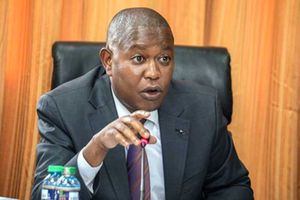Criteria that can help us choose good leaders in August

A voter casts her vote during the 2017 General Election.
Amidst insistent jabs at a Church that has ditched its mission to lead God’s people in critical moments, like the upcoming General Election, a recent roundtable discussion of the International Ecumenical Movement – Kenya Chapter (IEM-K) was like a breath of fresh air.
Attended by clergy and laity from different Christian denominations including Presbyterians, Anglicans, Lutherans and Orthodox, the venue — the iconic Our Lady Queen of Peace Catholic Church in South B — evoked memories of December 2000 when the old church was torched in clashes between Muslim and Christian youths.
Tellingly, former Anglican Archbishop David Gitari was injured in the melee in which dozens were hurt after he led a group of religious leaders to the scene on a mission to restore peace. Gitari, who died in September 2013, featured at the roundtable meeting titled ‘The 2022 General Elections: Leadership and Responsibility in Nurturing the Culture of Peaceful Electoral Processes in Kenya’.
Choose leaders
International Leadership University Vice-Chancellor Tim Kiruhi gave the keynote address in which he shared tips on how to choose leaders in the August 9 elections. He spoke after Rev Isaiah Obare, the IEM-K vice-chairperson, welcomed participants and also introduced Dr Joseph Mutei of St Paul’s University, Limuru, the keynote address discussant. “It concerns us whenever elections are near after what transpired in 2007/08 elections,” he told the gathering.
Prof Kiruhi raised questions that bother voters—like disillusionment with polls that keep returning the same faces. Well over half of Kenya’s youth, he said, say they won’t be voting. Something is wrong “and if we don’t take care of it, we’ll follow what’s happening in French-speaking West Africa... returning to coups.”
Involving Kenyans in electioneering is the answer to voter apathy. Prof Kiruhi gave a five-point guide, which, he said, was arrived at during an interdenominational forum. If followed, it would spare Kenyans bad leadership—like that of former Nairobi governor Mike Sonko. Though impeached, Mr Sonko is determined to be Mombasa governor. He’s not alone. Hundreds of candidates are tainted with scandals. Prof Kiruhi accused citizens of lowering the leadership bar by voting for bad leaders.
Top on the list of criteria for choosing a leader, Prof Kiruhi said, is character. If good character is required of a church elder overseeing a small congregation, he wondered why we would demand less of a president. Knowing candidates’ character can help citizens vote for the right candidates. Currently, tribe and wealth determine the winner. In this regard, Prof Kiruhi advised against ‘six-piece voting’, describing it as ‘very irresponsible’.
The second criterion is ability to empower people and be a servant leader. Kenya’s crisis stems from fear to groom successors. Hence, when one retires, there’s no worthy successor.
The third benchmark is visionary leadership. A candidate who failed in his previous office cannot transform a country.
Fourthly, the candidate should commit to protect family values. “Does he or she have a clear stand on issues like abortion?” he posed.
Fifth is human dignity. Does your candidate care for the underprivileged? Prof Kiruhi condemned the persistence of ‘flying toilets’ in Nairobi’s informal settlements as dehumanising, more so that each MP has a Constituency Development Fund budget.
People living in inhuman conditions cannot fight for their rights. “Politicians know they just need to give you 50 shillings [to vote for them],” hence, the importance of changing people’s degrading livelihoods. Sadly, far too many citizens vote with their emotions (‘my tribe’, ‘his wealth’) instead of voting with their brains. Engaging with candidates helps to hold them to account once in office. And it’s not difficult since no one wishes to miss a chance of election, Prof Kiruhi added.
Responding, Dr Mutei underlined church involvement. He paraphrased Archbishop Gitari, who likened the relationship of Church and State to one’s relationship with fire. If you stay too far from the fire, you’ll get cold, but if you come too close, get burnt. Christians should ask themselves: “What is my proximity to politics?”
The answer is not to align with the ruling class, or remain passive on the pretext of being apolitical; Churches should engage in critical and constructive collaboration with the state, since they’re serving the same community… and because Kenyans are 70-to-80 per cent Christian.”





